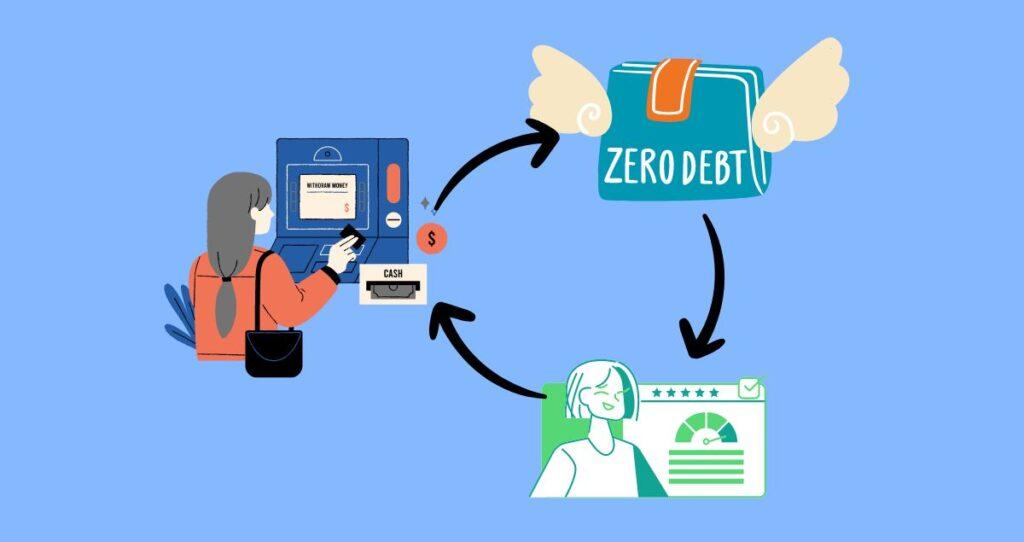Building your credit is one of the best financial steps you need to take in this era. The good news is that there are tips you can use to build credit fast with less stress. If you have bad credit or have no credit at all, don’t give up yet.
You can still take control of your finances and build credit fast by taking advantage of financial products and services around you. In addition, building credit is about financial behavior and what you do with your credit accounts. Most people think that in order to build a credit history or repair your credit, you need to get costly loans and mortgages. This is far from reality.
Effective methods you will need to build credit fast will be based on how you choose to use your credit accounts. It is not the lender. It is you. That is why you need to focus on what you do rather than what the bank expects you to do.
In this article, I will walk you through 13 effective ways to boost your credit and improve your credit score fast.
How long does it take to build credit?
Building a credit history and credit score is like raising a baby. When your baby is sick or is not happy, you figure out what is wrong or take the baby to the hospital. It also takes time to raise a baby into an adult. The same concept applies to your credit journey. Just because you got a credit card or a loan, it does not mean you have established good credit. That is your first step and what you after matters the most.
Credit history is about your historical performance with credit. Every decision you made with your credit accounts in the past until now affects the health of your credit. Did you make payments on time, how much debt do you have, what is your utilization rate, and do you have negative items on your credit reports such as bankruptcies, foreclosures, evictions, tax liens, charge-offs, or late payments? What is the age of your credit and how many inquiries do you have? These are some of the factors that will affect the health of your credit and credit score.
Generally speaking, it will take about six months to build a meaningful credit. Keep in mind that how fast you build your credit will depend on every little decision you make with your credit account activities. If you want to aggressively build your credit, then you have to come up with a plan. However, you can still build credit passively by becoming a loyal and responsible credit user.
The following are tips you can use to build credit fast.
1. Get a copy of your credit report
The first step in building your credit fast is to get a copy of your credit report. You cannot build credit fast without knowing what is hurting it. A credit report will have all information related to all your credit accounts and how activities from each account are affecting your credit and credit score.
From there, you will clean up your credit reports. All information in your credit reports should be updated and correct.
You don’t have to pay a single penny for a copy of your annual credit report. All three major credit reporting agencies(Equifax, TransUnion, and Experian) are required to give you a free copy of your annual credit report once in 12 months.
You can easily get a copy from each major bureau online from the following website: https://www.annualcreditreport.com/index.action. You can also call the following number (877) 322-8228 if you don’t want to get your reports online.
If you want more details on how to get a free copy of your credit report, refer to the following guide.
Related: How Long Does it Take for a Credit Report to Update?
2. Dispute errors and inaccuracies in your credit reports
It is possible that you have bad credit due to inaccurate, errors, identity theft, or other fraudulent activities on our credit reports. After checking your credit reports, you’ll need to read them line by line to make sure that all information is correct and updated.
Should you find any inaccurate information in your report? Dispute all errors, inaccuracies, and fraudulent activities and bring our accounts to current conditions. This process alone can help you boost your credit score and repair your credit fast.
3. Have removable negative items removed from your credit reports
Bad credits are associated with past financial decisions. Any bad decision you made with your credit will be reflected on your credit reports. Some of these negative items can stay on your credit reports for 7 years or even 10 years. Although their effects on your credit and credit score will fade away over time, they don’t look good on your credit profile. If there is any removable negative item, have it removed from your credit reports.
The following are some of the negative items you might find on your credit report.
- Charge-offs
- Accounts in collections
- Bankruptcies
- Evictions
- Foreclosures
- Medical bills
- Late payments, etc.
If these negative items have been reported on your credit report by errors, have them removed or corrected.
You can easily dispute them with corresponding credit account providers such as mortgage providers, landlords, etc. For example, if you paid off an account but it continues to show on your report, you can ask your lender to delete the information from your credit reports. Make sure that you have all proof related to your account activities.
If the negative items are correct, however, they will stay on your credit report. You can also submit a goodwill letter to your lender and nicely ask them to remove the information from your report.
4. Reduce your credit utilization to under 30%
No matter how you look at this point, a higher credit utilization shows that you rely on credit to cover your expenses. That is why your credit utilization is the second factor that affects your FICO score(30% of your credit calculation).
In order to build credit fast, you need to lower your credit utilization. Experts suggest that you keep your credit utilization to under 30%. However, this percentage is still high given the fact that you will be paying interest rates on the balance you are carrying over to the next payment cycle. To minimize the effect of your credit utilization on our credit, keep your credit utilization as low as you can. If you can manage it, bring your utilization to under 10%.
Both FICO score and VantageScore give higher weight to your credit utilization. You can build credit fast if you have unacceptable credit utilization. The lower your utilization the better.
5. Pay off your bills on time
The biggest factor that affects your credit and credit score is your payment history. Major credit reporting agencies apply higher weights to your credit account payment activities. At the end of the day, no one can trust you with more loans if you cannot pay off the money you borrowed already.
Your payment history accounts for 35% of your FICO score calculation and 40% of your VantageScore calculation. In order to build credit fast, you need to pay all your bills on time.
Paying your bills in full and on time also prevents you from carrying balances to the following billing cycles. Lenders and creditors apply interest and charges in the form of an annual percentage rate(APR) on the balance you did not pay in full and/or on time.
Some lenders have minimum requirements for each account per month. If you cannot pay the entire balance, at least pay the minimum requirements on each account.
An authorized user of a credit card is a person who gets added to another credit card account. For example, parents can add their children or spouses to their credit card accounts as authorized users. After you have become an authorized user, you will receive your own credit card that is linked to the primary account. The account owner will add you to the account with the help you the credit card provider. Some card issuers charge an annual fee to become an authorized user of a credit card account.
As an authorized user, you are not responsible for any activity on the account. All responsibilities such as paying bills, monitoring credit, credit limit increase, etc, fall in the hands of the account owner.
Most lenders report authorized user activities to major bureaus which can help you boost your credit and improve your credit score. Of course, you must use the credit card responsibly and pay the original owner on time. You should also become an authorized user when the account owner has a good credit score and excellent credit history. This way, you will be benefiting from every positive activity on the account.
7. Get a secured credit card
A secured credit card is a credit card where you deposit money before you open an account. The deposit is known as a security deposit that you give to the card provider just like you do on your apartment security deposit. Each secured credit card comes with its own deposit amount and line of credit.
You get to use the credit card and make timely monthly payments on the money you spend on the card. When it comes to closing your account, you will get your deposit back. Any account activities can help you build your credit fast and improve your credit score. That is if you use the card responsibly, your credit score will go higher, you will qualify for a higher credit limit increase, and on top of that, you will be building your credit history.
8. Request credit limit increase or line of credit increase
When it comes to building your credit fast, you need to employ every tip and resource at your disposal. One option that works automatically, is the request for a higher credit limit. As you use your card and pay off your bills on time, your credit card issuer will eventually increase your credit limit automatically.
Some lenders, however, take a long time to increase your credit limit. What you can do in this case, is to ask your credit card issuer to increase your credit limit. Your lender will evaluate your request and how you have been using the balance you have been given already. If your history looks good, the lender will increase your credit limit.
How can increasing your credit limit help you build your credit fast?
Credit is all about how you use your credit. If you have a higher utilization rate, a higher credit limit will automatically reduce your credit utilization. By lowering your utilization, your credit score will go higher. A higher credit score indicates that you have healthy credit.
Keep in mind that some lenders will check your credit file. This activity will result in a hard inquiry into your credit reports. Hence, lowering your credit score by a few points. This reduction in credit score will be temporary as hard inquiry will not affect your credit score after 12 months. However, you should expect hard inquiries to remain on your credit report for 24 months.
9. Do not apply for credit very often
Every time you apply for new credit, the lender requests to see your credit file. This activity results in a hard inquiry on your credit report. A hard inquiry will lower your score up to 10 points. If you apply for credits many times at different time intervals, you might end up hurting your credit score and credit history.
One trick you can use is to apply for credit in the same time interval. For example, instead of applying for a mortgage now and a car loan next month; you can apply for those credit accounts in a two weeks interval. Some credit bureaus will treat some credit inquiries as a single inquiry if they are submitted in a 14 days timeframe. The typical range is between 14 to 45 days. As long as your inquiries are submitted in this time frame, some scoring models will treat them as a single inquiry. Keep in mind that this exception does not apply to all types of loans.
Having all your inquiries grouped into a single inquiry will result in a much lower reduction in your credit score. Instead of losing 24 points from three inquiries, you might lose only 6 points because all those inquiries were grouped into a single inquiry.
Building your credit fast also comes with protecting what you have already. That is why you need to avoid destroying your credit any further. Smart choices lead to greater results. So, if you are planning to apply for credit accounts, apply for all of them at the same time. This way, the inquiries will have less impact on the health of your credit.
10. Do not close a credit account
One big mistake people make is to close a credit account. For example, people apply for many credit cards and later realize that they no longer need all of them. So, they close some of those accounts.
If you are in the process of building your credit fast, avoid closing accounts you are not using. This is because closing an account will directly affect the health of your credit and potentially lower your credit score.
- Closing an account will increase your credit utilization. By closing an account, your utilization rate could automatically go higher since the credit limit from the account you closed will not be considered in the new credit limit. A higher utilization rate will lower your credit score and affect your credit. Your utilization accounts for 30% of your FICO score calculation.
- Closing an account will affect your credit mix. Your credit mix is a major factor in your credit score. By closing a credit account, you might end up affecting your credit mix which accounts for 10% of your credit score calculation.
- Closing a credit account will result in lowering the age of your credit. The age of your credit is the average age of all credit accounts you have. If you close an account, especially an old one, you will end up lowering the overall age of your credit. Your credit age accounts for 15% of your FICO score. A closed account will affect your credit and lower your credit score.
11. Have your landlord and utility companies report your payments activities to credit bureaus
One of the best ways to build credit fast that many people overlook is to report your utility and rent payments to major credit bureaus. Most companies do not report this information to credit reporting bureaus which means they are not used in building their credit. If you pay bills on time, why not benefit from your hard work?
Once this information is available to credit bureaus, it will be included in your credit rating. This is an effective way to build your credit fast without spending extra resources.
12. Use debt consolidation/balance transfers to manage your debts
Debt consolidation and balance transfers help you move your debts to other lenders or group them into one account. If you have bad credit due to uncontrollable debts, it is probably time you look into ways to manage your debts.
Debt consolidation and/or balance transfer can help you lock in a lower interest rate and manage your credit accounts. This in return can help you manage and pay off your debts and build your credit fast.
13. Pay off accounts in collections
When you fail to make your payments on time, late payments will be reported on your credit reports 30 days past the due date. Late payments that are not covered 90 days from the due date can become charge-offs and a collection company will come after you.
If you have accounts in collections, try to pay them off as fast as you can. Being in collection affects the health of your credit and significantly lower your credit score. However, if you can pay off those accounts, you might improve your credit fast.
The collection will still show on your accounts for 7 years, but your credit will improve. Some credit scoring models from different reporting bureaus put less weight on paid-off collections than active accounts in collections.
Benefits of having good credit and credit score
Having good credit history and credit score is essential in this era. Everywhere you go, they want to check our credit score and credit history. Almost every business you deal with including employers is looking for people who are financially responsible.
Why should you worry about having a good credit score?
Unless you are planning to buy everything with cash, you will need to borrow money. When it comes to borrowing, lenders rely on your historical performance with credit to estimate how you will behave in the future. In order words, lenders use your credit score and credit history to assess your creditworthiness.
- Having bad credit and a bad credit score means that you are a risky borrower(deep prime and subprime borrower). For this reason, you will be denied credit or pay a higher interest rate to offset the risks lenders are taking by lending you money.
- Good credit and a good credit score show that you are responsible when it comes to credit. For this reason, there are fewer risks involved in lending you money. That put you in the prime and superprime categories of borrowers. As a result, you will qualify for better rates with affordable terms.
- Your credit score can help you qualify for services that you would otherwise have to pay for if you did not have a good credit score. For example, a landlord can waive a deposit if you have a good credit score. A good credit score shows that you are more likely to make all your payments in full and on time. For this reason, you will be a good tenant.
- Utility companies also use your score to give you either discounts or waive the deposit. Some employers might use information from your credit reports to give you or deny you a job.
The bottom line
Building credit is not a one-day process. It is a process that builds upon your daily credit account activities. In order to build your credit fast, you need to first understand where you stand and how current information on your credit reports is affecting the health of your credit.
You can easily boost your credit and improve your credit score by simply cleaning up your credit reports. Other activities that can help you build credit fast, include but are not limited to, paying your bills on time, reducing your credit utilization, keeping your accounts open, and managing your debts.









